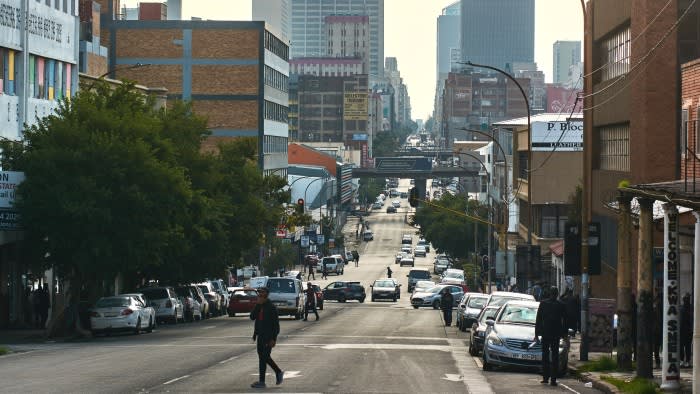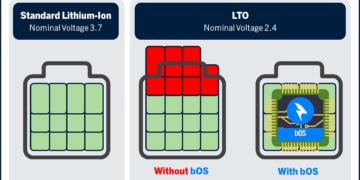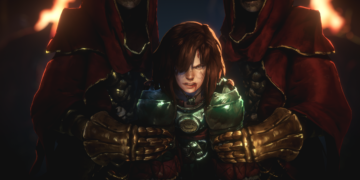Ghosts, says a character in Simon Stephens’ moving new play Morning Sun, aren’t the sheet-covered goblins of a child’s imagining, but rather simply “interruptions.” Of what? That goes unsaid, but the small rifts, lasting hurts, unexpected connections and everyday forgivenesses that make up the life portrayed by the extraordinary Edie Falco suggest that existing without interruptions would be a sad fate indeed.
Morning Sun, opening tonight in its Off Broadway world premiere at the Manhattan Theatre Club, presents what might be called a life in full, even if the life on view is only as remarkable as any other, which is to say, remarkable.
Falco, Blair Brown and Marin Ireland portray three generations of the McBrides, New York women who see Greenwich Village through the latter half of the 20th Century and into the 21st, from World War II, Jane Jacobs and the Beatles at Shea through Joni Mitchell, bell-bottoms, the decimations of AIDS, 9/11 and beyond.
Falco plays Charley McBride, the character in the middle of it all, literally and figuratively. She’s a baby boomer, daughter of Brown’s prickly Claudette and single mother to Ireland’s devoted Tessa. As written by Stephens (The Curious Incident Of The Dog In The Night Time) and directed with gorgeous fluidity by Lila Neugebauer (The Waverly Gallery), Morning Sun depicts the women’s lives in both reflection and the immediate. The actors slip in and out of “present day” action and go unstuck in time, reflecting on the experiences just portrayed from a vantage point many years in the future. They speak to one another both in the moment of the scene and outside of it, as if reviewing their actions from some vantage point long after death.
Here, for example, is what daughter Tessa observes after Charley describes college years spent mired in secretarial school while the turbulence of the early 1970s grabs hold of the city around her.
“While the City is burning at the end of the sixties. While Valerie Solanis shoots Andy Warhol. While the Weathermen blow up 18 West 11th kind of by mistake…You are eating your lunch on Brighton Beach and training to run the world. You’re eighteen years old and there are moments when you feel like you are training to run the world.”
But Charley doesn’t run the world, settling instead to help run a small but significant piece of it: She will spend her life as a receptionist at St. Vincent’s Hospital in the West Village, from where she will see, and help, an assortment of people as varied and diverse as the city itself. She will be there when the hospital becomes Ground Zero for the AIDS crisis, and will first mourn the unending number of casualties and then, in 2012, the building itself when the hospital is demolished to make way for new housing.

Matthew Murphy
Performed on a set that seems less real and more suggestion, or perhaps fading memory, of a living space – sticks of furniture here, a small kitchen there – the play is performed by its excellent cast with the precision and grace of a ballet, with each actor fading in and out of time periods, conversations, soliloquies, additional characters and perspectives. Morning Sun is a beautiful thing to watch, as much for the elegant dance of its moving pieces as for its powerful understanding of the pains and joys of those remarkable unremarkable lives.
If the introductions, or mentions, really, of historical events can sometimes feel forced – “And then on the 8th of December 1980 at the exact moment that John Lennon is shot outside the Dakota building on the west side of the park me and you…we’re smoking a joint with an airline pilot….outside the White Horse Tavern…” – the overall effect is to situation Charley, her family and friends in the very real New York City that they love so much.
Through it all, Charley, Claudette and Tessa recall and re-enact the quotidian and the milestones, the petty arguments that turn vicious, the blossoming of new loves and friendships and their inevitable ends, the excitements of youth, the disappointments of middle age and the joys and sadnesses that live on in our memories. In the end, Morning Sun seems to be consoling us, reminding us that the interruptions are what forms our lives, and are the ghosts we’ll carry with us.

:quality(70)/cloudfront-eu-central-1.images.arcpublishing.com/irishtimes/RLEPR37I34T4PGACCOZZTXBRVY.jpg?resize=1200,630&ssl=1)













